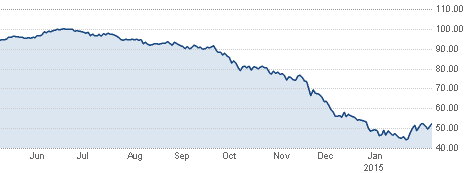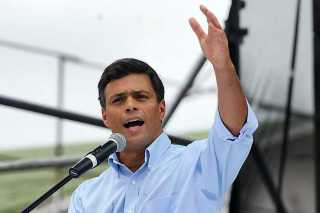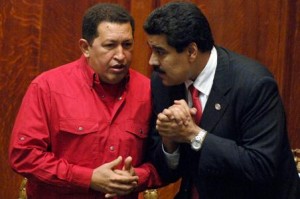Everything is connected… Climate change is related to energy use and the price of energy is related to geopolitical issues some of which are related to climate change. All have a major impact on business and the business landscape to use my colleague Pankaj Ghemawat’s phrase.

The spectacular drop in oil prices since June of last year is having knock on effects of different kinds in different places.
To frack or not to frack?
A little over a year ago I wrote a series of posts on the rise of fracking which dealt with environmental risks, the impact on global energy markets, and links to geopolitical concerns such as the unfolding crisis in Ukraine.
The technology is used both for unlocking natural gas and also what is called tight oil or wells that were simply not economical to drill in the past. With the benchmark price in the U.S., West Texas Intermediate, apparently stable at around $100 per barrel during the last few years, fracking of both oil and natural gas took off.
What is apparently going on over the last six months is a calculated play by the national oil company of Saudi Arabia to keep oil production high enough for the price to collapse below the production cost of tight oil which is estimated to be somewhere between $60 – $ 70 per barrel.
Marketwatch reports that the strategy is working and that the number of rigs actively drilling for oil and natural gas has fallen by 23% since last year.
Venezuela (again)
According to the The Guardian, oil exports account for 95% of Venezuela’s hard currency income and the the drop in price is hurting the government of Nicolás Maduro and the people of Venezuela who are protesting again.

Last Wednesday Leopoldo Lopez and two other opposition leaders published a statement calling for a peaceful transition to the rule of law and democracy. Lopez has passed the last 10 months in prison after turning himself in over the protests that erupted about a year ago and which were brutally suppressed by the Maduro regime.
A day later, Maduro’s government arrested 11 people in a reported attempted coup. The BBC has reported that the idea of a coup was implausible and cited the U.S. State Department as saying that the charges were ludicrous.
No Money, No Votes

As Venezuela’s economy comes crashing down and its people suffer, it is hard to see how Maduro’s government will survive. Maduro’s mentor and predecessor, Hugo Chavez, funnelled huge amounts of money to Venezuela’s poor and working class in exchange for their political support but with the fall in oil prices, it is unclear how the regime will continue.
The protests last year involved mainly students and middle class people and were put down in part by motorcycle riding thugs who broke up demonstrations and killed people with tacit support of the regime. If the base of the population turns against him, these forces will be insufficient to turn the tide.
 Another issue is assuming that there is an eventual transition in Venezuela, what will happen to the $20 billion worth of oil that the Financial Times says is still owed to China? The FT reports that China lent the Chavez and Maduro governments about $ 40 billion and actually helped precipitate the country’s collapse as the regime was spending even more than it was making in the international oil markets.
Another issue is assuming that there is an eventual transition in Venezuela, what will happen to the $20 billion worth of oil that the Financial Times says is still owed to China? The FT reports that China lent the Chavez and Maduro governments about $ 40 billion and actually helped precipitate the country’s collapse as the regime was spending even more than it was making in the international oil markets.
Will a new Venezuelan government led by Enrique Capriles or Lopez honor the agreement with China? What will China do if they do not?

